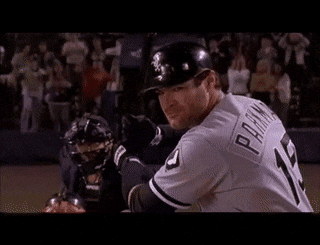Thanks to Brian Kenny and MLB Network’s constant re-runs of the greatest baseball movies ever made, this debate transitioned from one you’d have with your friends to one that has the potential to be the next “Is Die Hard a Christmas movie?”. Dan Le Batard’s show had a Twitter poll this week on the topic and people got ANGRY. If you look at the numbers, the answer seems simple. The first “Major League” has a “solid fresh” rating of 82% on Rotten Tomatoes with a 84% Audience Score while the sequel has a “rotten” 5% with a 45% Audience Score. Also the first movie made an impressive $49.8M on a $11M budget, while its successor received $30.6M on a $25M budget. The first “Major League” has a phenomenal story with characters you’re invested in along with a story that is all too realistic in today’s tanking culture. However, “Major League II” is a significantly funnier movie, with stronger character development and much more memorable scenes. Think I’m crazy or wrong? Here’s why.
Hiroshi Tanaka is funnier than any character from the first one

Fewer characters have ever come in more hot than Tanaka does in “Major League II”. Right after ownership breaks the news to manager Lou Brown that they acquired the Japanese outfielder, the scene immediately cuts to him incessantly screaming as he then runs into a wall trying to catch a ball. There are few characters in film history that are consistently funny in every scene that they’re in. Whether it’s the famous “marbles” scene or his overall reactions during the Indians winning streak en route to the playoffs, Tanaka is absolutely hilarious and makes this movie so re-watchable for even the 100th time.
Jack Parkman is a better villain than Clu Haywood

How many people who’ve casually seen the “Major League” movies, can probably not even name the villain from the first movie? Everyone who has seen “Major League II” multiple times, will not only know who Jack Parkman is, but they’ll know the world famous “shimmy” as well. Parkman is the perfect villain for a sports movie. He’s a bigger diva than any NFL wide receiver and says his teammates are “either losers by choice or by birth” on record to the media. He’s the ultimate type of player that you’d hate unless he’s on your team as he’s a supremely talented player, but a grade A jerk. What was Clu Haywood’s biggest crime? Playing for the Yankees? Parkman is so unlikable, that not only do you root for Willie Mays-Hayes when he leaps over him, but the audience feels he doesn’t get a taste of his own medicine until Rick Vaughn strikes him out at the end. That is a villain worth rooting against.
Randy Quaid is an incredible addition

In possibly one of his best roles in his illustrious career, Randy Quaid somehow went uncredited in “Major League II”. He plays the role of a die hard Indians fan who considers himself the face of the fanbase, despite being nowhere to be seen during the previous season. He sticks with the team through it all as he consistently goes to every home game and badgers the players so much that their star pitcher even loses his focus on the field. One can only imagine what would happen if Randy Quaid’s character had a Twitter account. The fans are a small part of the story in the first one as they are just shown to get their reactions throughout the movie. The most memorable line from the fans in “Major League” is “too high, what do you mean too high?!”, but besides that, what is there? Quaid’s character’s mood changes throughout the film is so accurate of a fan going through the motions of a long season. That’s what makes him so special.
Rick Vaughn’s character arc is very intriguing

In “Major League”, the main protagonist is Jake Taylor who is fighting his way towards one last year of relevancy in a profession that he feels is the only aspect of life that he can succeed in. In “Major League II”, it follows Rick Vaughn as he goes from a top rookie that came out of nowhere to a marketable superstar. He disappoints his fans early on as he transitions from motorcycle to limousine, buzzcut to clean cut and closer to starter. After running into a former beau who works with at-risk children, he begins to question his new identity and later saves the day to get the Indians to the World Series. Vaughn’s transition is a storyline we see in so many athletes and hope it goes the way it did for “Wild Thing”. It’s what makes it such a great narrative for a character we’ve enjoyed so much since his introduction.
Bob Uecker’s character gets even better

Bob Uecker has had a fascinating career in baseball and the lure of his character in the “Major League” movies only makes him more of a legend. It’s incredibly funny and unusual to see such a longtime broadcaster be so honest and vulgar in a film. Sure Uecker has some very memorable lines in “Major League”, but there are few moments than can top him getting so drunk that he passes out during a broadcast. Uecker does it all in this one from bullying his coworker, making harsh remarks regarding Parkman and make some unforgettable calls. In a movie with so many dominant characters, Uecker has his moments where he takes the stage like Rodney Dangerfield in “Caddyshack”. Not bad for a former mere .200 hitter in the Major Leagues.